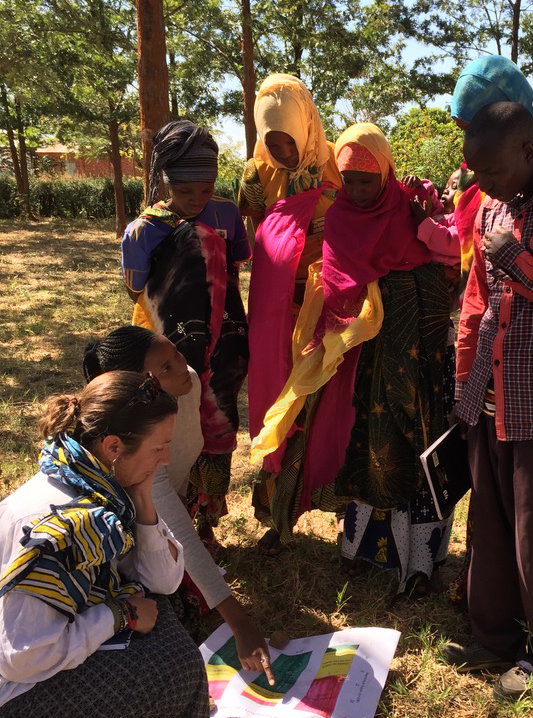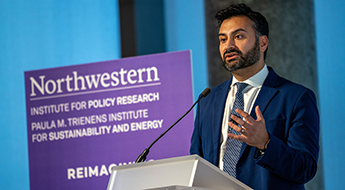Empowering Women Farmers Yields Higher-Quality Crops in Low-Income Countries
Study shows doing so can improve global food supply, while supporting women’s rights
Get all our news
This is striking evidence that empowering women to make decisions about what is best for their families, in this case, letting them make choices about which crops are planted, has far reaching consequences.”
Sera Young
IPR anthropologist

Sera Young (far left) works with farmers in rural Tanzania on
an experiment to improve gender equality in farming.
Empowering women farmers in low- and middle-income countries can lead to greater crop diversity, which helps to improve the year-round supply of healthy foods, according to a new study published in the Lancet Planetary Health.
Involving women more in agricultural decision making, community groups, and the ownership of farm equipment results in growing crops that are nutritionally richer.
Most of the world’s farmers own small plots of land, and women make up more than half of the agricultural workforce, but they typically have limited control over decision making, including about the crops they grow.
The international research team analyzed data from four countries, Burkina Faso, India, Malawi, and Tanzania, to explore the relationship between women’s empowerment and crop diversity.
IPR anthropologist Sera Young, an expert on international food and water insecurity in low-income countries, worked with the study’s lead author Lilia Bliznashka of the University of Edinburgh and the International Food Policy Research Institute and an international group of colleagues from the Harvard T.H. Chan School of Public Health, London School of Hygiene & Tropical Medicine, Cornell University, and University of Oxford.
This study builds on Young’s 2021 study with small holder farmers in rural Tanzania, which shows that an intervention to improve gender equity, increase agroecological farming, and educate about nutrition decreased food insecurity by 12.5 percentage points and improved the diversity of children’s diet. It also reduced women’s depressive symptoms.
In the 2023 study, the researchers also show that growing a wider variety of crops brings environmental and economic benefits. They include improved soil fertility and a reduced threat of pests and crop diseases, permitting farmers to be more resilient in dealing with increasingly erratic weather patterns intensified by climate change. Greater crop diversity also allows farmers to adapt more quickly to market changes.
The researchers' findings suggest a way that the global food supply could be protected, while supporting women’s rights.
"This is striking evidence that empowering women to make decisions about what is best for their families, in this case, letting them make choices about which crops are planted, has far reaching consequences," Young said.
In addition to Young’s Tanzania study, the study builds on previous research conducted in South Asia showing that supporting women farmers could enhance crop production and diversity, revealing that the findings apply to other regions as well.
Analysis in the Lancet study reveals that when women got more involved in farming, three key measures of crop diversity rose—the number of crops and food groups grown and if nutrient-dense crops were grown.
In low- and middle-income countries, crops produced by farmers of small fields are vital to protect the livelihoods and food supplies of local communities in a world where climate change is becoming an increasing threat to these livelihoods.
The research team plans to translate these findings into targeted interventions that support women and improve crop diversity, without adding to women’s existing workloads.
"We hope to encourage efforts to consider women’s empowerment in the context of agricultural production and food system resilience to support critical win-win agendas for women’s rights and for the provision of a healthy diet from a healthy planet," Bliznashka said.
Funding from the Bill and Melinda Gates Foundation supported the study.
Sera Young is associate professor of anthropology and global health and an IPR fellow.
Source: University of Edinburgh press release.
Published: July 11, 2023.


